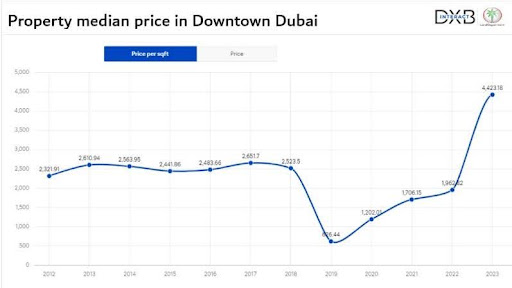Recent Statistics
Foreign Investment Surge: In 2023, foreign investors accounted for 45% of total commercial property transactions in Dubai. According to DXB Interact “see figure 1.1” it reflects solely towards the commercial transactions within Downtown Burj Khalifa area.

Figure 1.1: Commercial Transactions in Downtown Burj Khalifa Area Supply Constraints: The commercial real estate supply in Dubai has experienced a continuous increase year-over-year, being challenged to meet the rising demand.
Construction Costs: Prices for key construction materials have risen by 20-30% in the past few months, impacting the overall cost of new projects.
For the UAE's real estate market to stabilize, the proportion of investors should not exceed 10% of the total yearly transactions. To pave the way for a mature real estate economy, over 90% of property transactions need to be dedicated to end users rather than investors. However, the UAE's ambitious plan to double its population by 2040 is likely to attract more investors in the short term, complicating efforts to achieve this balance.
Strategic Insights
Population Growth: With the UAE aiming to double its population to 18 million by 2040, there will be an inevitable increase in both commercial and housing demand. This demographic expansion will likely skew the market towards investors looking to capitalize on this growth.
Policy Interventions: To counteract this, the UAE government may introduce new policies, regulations, and fees aimed at making the market more attractive to end users and less appealing to speculative investors.
Future strategies of major developers are also likely to evolve in response to these changes. Developers may increasingly focus on rental yields rather than selling off-plan units, and we can anticipate a rise in rent-to-own schemes. The banking sector will play a crucial role in this transition by offering attractive low-interest rates, encouraging property buyers to opt for mortgages rather than cash transactions.
Market Projections
Rent-to-Own Trends: By 2040, it is projected to target middle class.
Banking Influence: Mortgage transactions are expected an annual slow rise as banks introduce more favorable loan terms.
Currently, Dubai has not yet reached the top 10 most expensive real estate markets globally. However, given the city's robust and diversified economic systems and strong future planning, Dubai's real estate prices could climb significantly over the next 5 to 10 years, potentially making it one of the most expensive real estate markets in the world.
Long-term Outlook
Price Growth: Real estate prices in Dubai are projected to increase by 8-10% annually over the next decade.
Economic Diversification: Continuous efforts to diversify the economy beyond oil and tourism will support sustained real estate growth.
In conclusion, while a price correction in Dubai's commercial real estate market is unlikely anytime soon, the introduction of strategic policies and a focus on end-user transactions will be key to achieving long-term stability. Even if global events pose challenges, the UAE has repeatedly demonstrated its resilience and ability to recover swiftly.
Stay up to date with DXB interact's real time property transactions